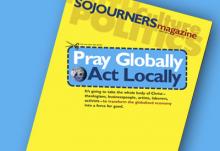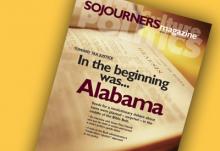Economic Justice

Hurricane Katrina opened the eyes of many to the reality of poverty in America. Will we take responsibility for the poor in our land of plenty?
While President Bush pledges to reduce poverty through tax reform, the number of low-income Americans-especially the working poor-continues to skyrocket, according to the "Working Hard, Falli
Book Review: American Dream: Three Women, Ten Kids, and a Nation's Drive to End Welfare (Viking: 2004).
Sojourners associate editor Rose Marie Berger and photographer Ryan Beiler spent a Sunday afternoon in February with Wendell Berry at his farm in Henry County, Kentucky. Berry is the author of more than forty books of fiction, poetry, and essays, including The Unsettling of America, What are People For?, Life is Beautiful, Citizenship Papers, and The Art of the Commonplace. He has farmed in a traditional manner for nearly forty years. Berry spoke with Sojourners about religious practice, Bluegrass country, defending against Wal-Mart, usury, and Jesus. - The Editors
ROSE MARIE BERGER: Tell me about this land, about this bioregion, about the history of your farm.
WENDELL BERRY: We're on the west side of the Kentucky River, in the Kentucky River Valley. Some people call this the Outer Bluegrass; there are other names for it. We have limestone soils. An old ocean or sea laid down these layers of limestone. There are lots of trees here. There are white, chinquapin, red, black, and shumard oaks. Those are the principle ones. And we have two or three kinds of ash, maples, several varieties of hickory, black walnut, sycamore, black locust, honey locust, cedar, basswood, red elm, slippery elm. We used to have chestnuts once. Tanya and I have 125 acres altogether, 75 here and about 50 on Cane Run.
This place where we're sitting today, is the old property known as Lane's Landing. Twelve acres, more or less, the deed says. Tanya and I bought it in 1964 and moved in the next year. So we've been here thirty-nine years.
Two distinct audiences will get much out of Lifting Up the Poor: religious activists who want to better understand the complex causes of poverty and communicate more effectively with policymakers about its elimination; and secular activists who want to learn about religious claims

